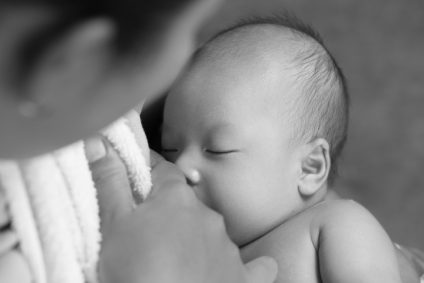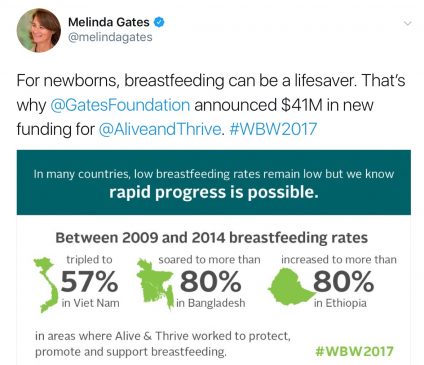
Dear Ms. Gates,
I hope I can take a moment of your time to talk about an issue that it is dear to both our hearts, albeit for different reasons.
You’re a mother of three children; I’m a mother of four. You breastfed your children; I breastfed mine. You promote breastfeeding worldwide to improve the health of babies; I’ve come to the conclusion that the aggressive, world wide promotion of breastfeeding is harming babies.
[pullquote align=”right” cite=”” link=”” color=”” class=”” size=””]The aggressive, world wide promotion of breastfeeding is HARMING babies.[/pullquote]
You and your husband invest in promoting breastfeeding because you believe that the scientific evidence shows it saves lives. I’d like to draw your attention to the fact that the scientific evidence is weak, conflicting and riddled with confounders; that there’s no evidence that breastfeeding rates have any impact on infant mortality; and, most importantly, that because of aggressive promotion, women are literally breastfeeding babies to death.
You have written:
Breastfeeding is the absolute gold standard in infant nutrition. Studies suggest it prevents everything from diarrhea to pneumonia to diabetes to obesity.
But the scientific evidence shows that breastfeeding DOESN’T prevent most of those things.
Many breastfeeding studies do not correct for confounders. Since, as you know, breastfeeding is correlated with maternal education and economic status, most of the benefits attributed to breastfeeding are actually benefits of being wealthier and having greater access to insurance and medical care.
No less an expert than Dr. Michael Kramer of the PROBIT studies that established that breastfeeding prevents colds and diarrheal illnesses has acknowledged that breastfeeding benefits have been grossly exaggerated. In an interview on Canadian radio he was emphatic that breastfeeding does NOT prevent obesity, does NOT prevent allergies, and does NOT prevent asthma.
When asked why lactivist organizations continue to insist on benefits that have been shown not to exist, he explains that these organizations rely upon preliminary data and simply refuse to accept anything that contradicts it. He is quite blunt that lactivist organizations won’t accept scientific evidence that doesn’t comport with what they believe and he worries that their insistence of exaggerating benefits will undermine women’s trust in healthcare providers.
I’m hoping that when apprised of this, you’ll go back to your experts and ask them for hard evidence that breastfeeding is really the miracle elixir they claim. They won’t have it.
Breastfeeding rates have no impact on infant mortality rates.*
I realize that’s not what you have been told, but what you’ve been told isn’t true. Studies that claim to show that breastfeeding saves lives (including the highly influential studies in the The Lancet) are based on mathematical models and extrapolations of small studies that assume that correlation is causation. But that’s not what happens in the real world. In other words, while breastfeeding saves lives in theory, it doesn’t do so in practice.
We know this from population data in both industrialized countries and the developing world. In the US, breastfeeding rates have varied widely in the past 100 years, starting at over 80%, dropping to a nadir of 24% in 1973 and rising again to rates to over 76%. At no time during those 100 years have breastfeeding rates had any impact on infant mortality rates, which dropped steadily throughout.
Both in the industrialized world and the developing world, countries with the highest breastfeeding rates tend to have the highest infant mortality rates and countries with the lowest breastfeeding rates have the lowest infant mortality rates.
During World Breastfeeding Week you posted the following on Twitter:

You noted that between 2009 and 2014 breastfeeding rates tripled to 57% in Vietnam, soared to more than 80% in Bangladesh and increased to more than 80% in Ethiopia. But what happened to infant mortality rates in response?
As far as I can determine, the change in breastfeeding rates had no impact in the trajectory of infant mortality rates. Perhaps you can ask your experts why, if breastfeeding purportedly saves lives, it hasn’t made any difference in those countries.
As a result of aggressive breastfeeding promotion, we are literally breastfeeding babies to death.
The Baby Friendly Hospital Initiative was implemented around the globe without any evidence that it increases breastfeeding rates. The Ten Steps of the initiative directly violate both scientific evidence and medical ethics. There is no evidence that locking up formula improves breastfeeding rates; there is no evidence that banning supplementation improves breastfeeding rates (and there is evidence that supplementation increases breastfeeding rates); there’s no evidence to justify banning pacifiers and considerable evidence that pacifiers reduce the risk of sudden infant death syndrome (SIDS); and it is deeply unethical to restrict what providers can say when counseling patients about infant feeding.
Worst of all, there’s a growing body of evidence that aggressive breastfeeding promotion is leading to brain injuries and deaths of infants from hypoglycemia, jaundice, dehydration, starvation and infants falling from or being smothered in their mothers’ hospital beds because well baby nurseries have been closed. It’s such a significant problem that 3 major papers have been published on the issue in the past year alone:
- The revised United States Preventive Services Task Force (USPSTF) guidelines
- Interventions Intended to Support Breastfeeding: Updated Assessment of Benefits and Harms
- Unintended Consequences of Current Breastfeeding Initiatives
In the developing world infants are literally starving to death because the WHO and UNICEF refuse to provide formula for them. As Gayle Tzemach Lemmon, senior fellow at the Council on Foreign Relations, wrote on CNN: Don’t make babies rely on breast milk in war zones. Babies in Iraq are starving to death even though they could easily be saved:
The surprising thing is that Lannaud and his colleagues at [Doctors Without Borders] didn’t place the blame for these underfed little ones just on war and the fact that the city was under siege. They also put the blame on other international organizations and policies that seek to do good.
“It isn’t a problem of access to food. The malnutrition we see here is primarily due to the scarcity of infant formula,” Lannaud wrote. “International organizations like UNICEF and the World Health Organization (WHO) promote breastfeeding … and provide infant formula, but only by prescription. We believe that distributing infant formula in a conflict situation like Iraq is the only way to avoid children having to be hospitalized for malnutrition.”
This is phenomenon known as white hat bias:
‘White hat bias’ (WHB) [is] bias leading to distortion of information in the service of what may be perceived to be righteous ends… WHB bias may be conjectured to be fuelled by feelings of righteous zeal, indignation toward certain aspects of industry, or other factors.
Babies are dying because the WHO and UNICEF are fired by righteous anger against formula manufacturers and their tactics of 50 years ago. But surely those charged with saving infant lives wouldn’t let them die just because they hate formula manufacturers? Actually they would.
In a remarkably tone deaf press release, Nurture Project International, “an international NGO providing technical lactation and nutrition support in Northern Iraq” insists:
Expertise, not milk powder, is the key to saving Mosul’s babies …
But babies cannot eat expertise; they need formula. A war zone is no place for ideologues who value process over outcome.
I’m writing to you, Ms. Gates, because you are deeply influential and profoundly committed to infant health. Breastfeeding, while a good thing, is not a magic, lifesaving elixir and those who claim otherwise have misled you.
I implore you to go back to your experts and ask them to address the fact that while there is no real world evidence to show that breastfeeding saves lives, there is considerable real world evidence that aggressive, unreasoning promotion of breastfeeding is killing babies.
Babies everywhere are depending on you.
*The major exception is the case of extremely premature infants where breastmilk lowers the risk of necrotizing enterocolitis, a deadly complication of prematurity.

